Depression: Types, Symptoms, and Caregiver Instructions
VerifiedAdded on 2022/12/27
|5
|1216
|77
AI Summary
This article provides information about depression, including its types, symptoms, and instructions for caregivers. It aims to increase knowledge about depression and help caregivers take preventive measures.
Contribute Materials
Your contribution can guide someone’s learning journey. Share your
documents today.
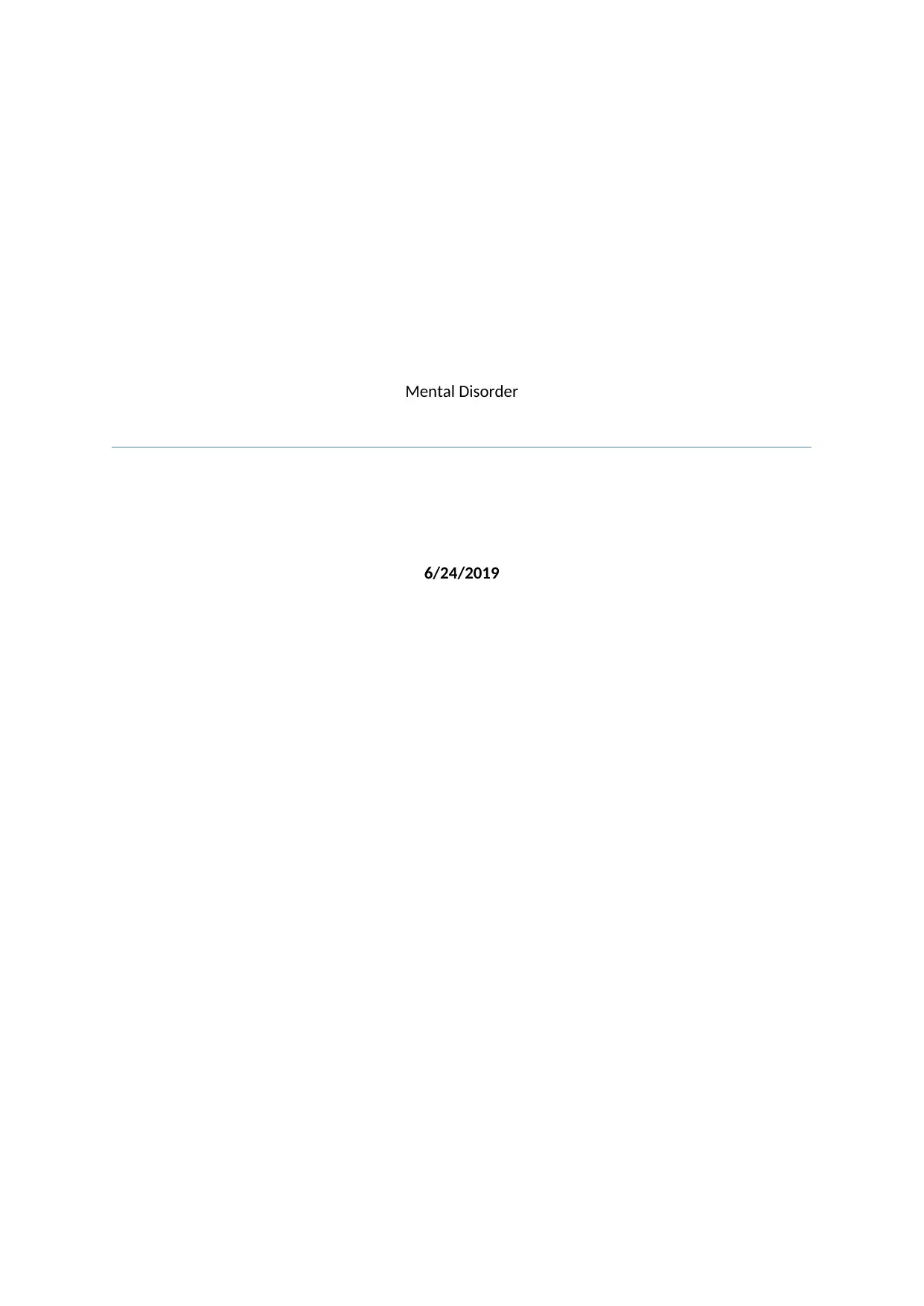
Mental Disorder
6/24/2019
6/24/2019
Secure Best Marks with AI Grader
Need help grading? Try our AI Grader for instant feedback on your assignments.
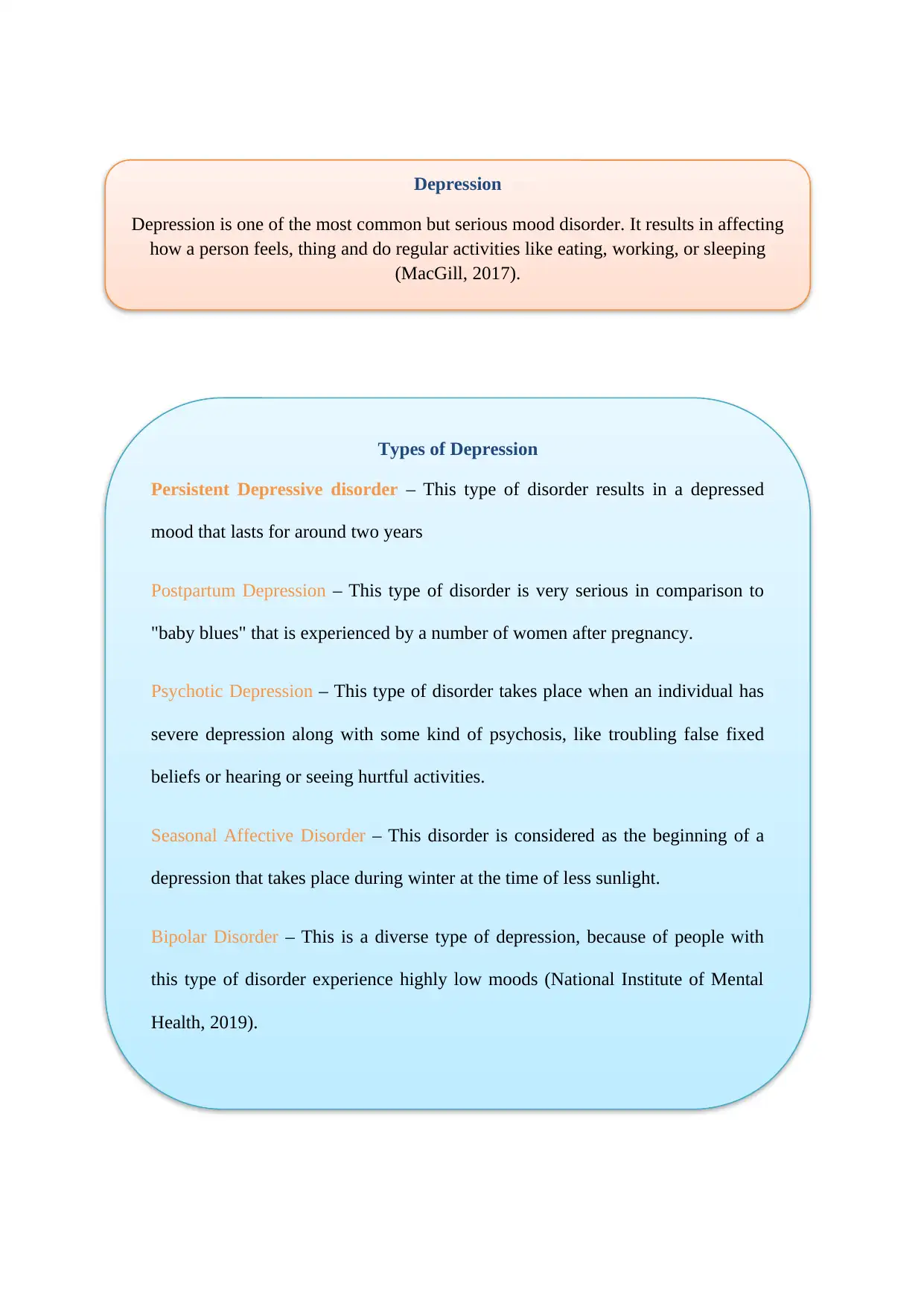
DepressionDepression
Depression is one of the most common but serious mood disorder. It results in affecting
how a person feels, thing and do regular activities like eating, working, or sleeping
(MacGill, 2017).
Types of Depression
Persistent Depressive disorder – This type of disorder results in a depressed
mood that lasts for around two years
Postpartum Depression – This type of disorder is very serious in comparison to
"baby blues" that is experienced by a number of women after pregnancy.
Psychotic Depression – This type of disorder takes place when an individual has
severe depression along with some kind of psychosis, like troubling false fixed
beliefs or hearing or seeing hurtful activities.
Seasonal Affective Disorder – This disorder is considered as the beginning of a
depression that takes place during winter at the time of less sunlight.
Bipolar Disorder – This is a diverse type of depression, because of people with
this type of disorder experience highly low moods (National Institute of Mental
Health, 2019).
Depression is one of the most common but serious mood disorder. It results in affecting
how a person feels, thing and do regular activities like eating, working, or sleeping
(MacGill, 2017).
Types of Depression
Persistent Depressive disorder – This type of disorder results in a depressed
mood that lasts for around two years
Postpartum Depression – This type of disorder is very serious in comparison to
"baby blues" that is experienced by a number of women after pregnancy.
Psychotic Depression – This type of disorder takes place when an individual has
severe depression along with some kind of psychosis, like troubling false fixed
beliefs or hearing or seeing hurtful activities.
Seasonal Affective Disorder – This disorder is considered as the beginning of a
depression that takes place during winter at the time of less sunlight.
Bipolar Disorder – This is a diverse type of depression, because of people with
this type of disorder experience highly low moods (National Institute of Mental
Health, 2019).
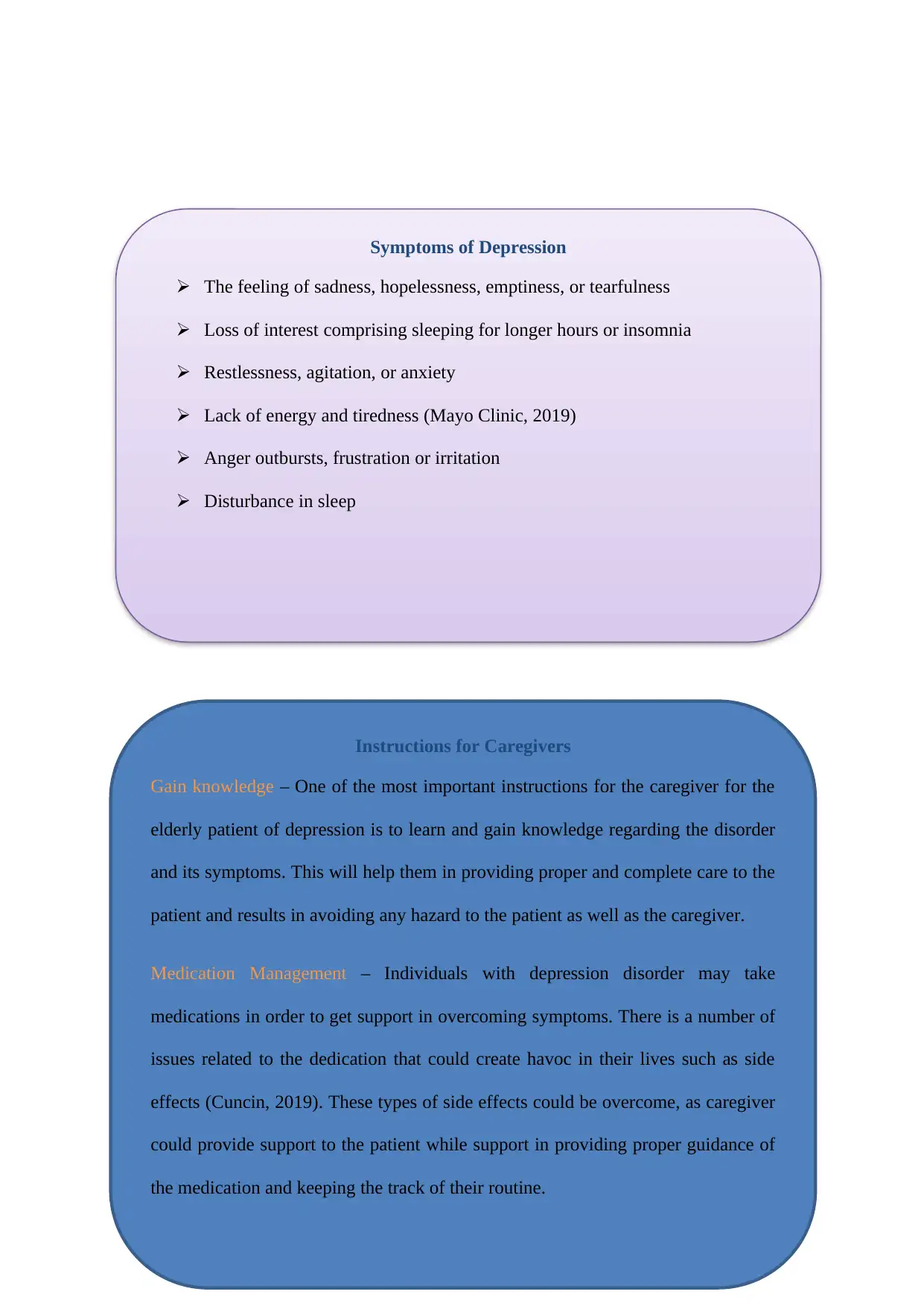
Symptoms of Depression
The feeling of sadness, hopelessness, emptiness, or tearfulness
Loss of interest comprising sleeping for longer hours or insomnia
Restlessness, agitation, or anxiety
Lack of energy and tiredness (Mayo Clinic, 2019)
Anger outbursts, frustration or irritation
Disturbance in sleep
Instructions for Caregivers
Gain knowledge – One of the most important instructions for the caregiver for the
elderly patient of depression is to learn and gain knowledge regarding the disorder
and its symptoms. This will help them in providing proper and complete care to the
patient and results in avoiding any hazard to the patient as well as the caregiver.
Medication Management – Individuals with depression disorder may take
medications in order to get support in overcoming symptoms. There is a number of
issues related to the dedication that could create havoc in their lives such as side
effects (Cuncin, 2019). These types of side effects could be overcome, as caregiver
could provide support to the patient while support in providing proper guidance of
the medication and keeping the track of their routine.
The feeling of sadness, hopelessness, emptiness, or tearfulness
Loss of interest comprising sleeping for longer hours or insomnia
Restlessness, agitation, or anxiety
Lack of energy and tiredness (Mayo Clinic, 2019)
Anger outbursts, frustration or irritation
Disturbance in sleep
Instructions for Caregivers
Gain knowledge – One of the most important instructions for the caregiver for the
elderly patient of depression is to learn and gain knowledge regarding the disorder
and its symptoms. This will help them in providing proper and complete care to the
patient and results in avoiding any hazard to the patient as well as the caregiver.
Medication Management – Individuals with depression disorder may take
medications in order to get support in overcoming symptoms. There is a number of
issues related to the dedication that could create havoc in their lives such as side
effects (Cuncin, 2019). These types of side effects could be overcome, as caregiver
could provide support to the patient while support in providing proper guidance of
the medication and keeping the track of their routine.
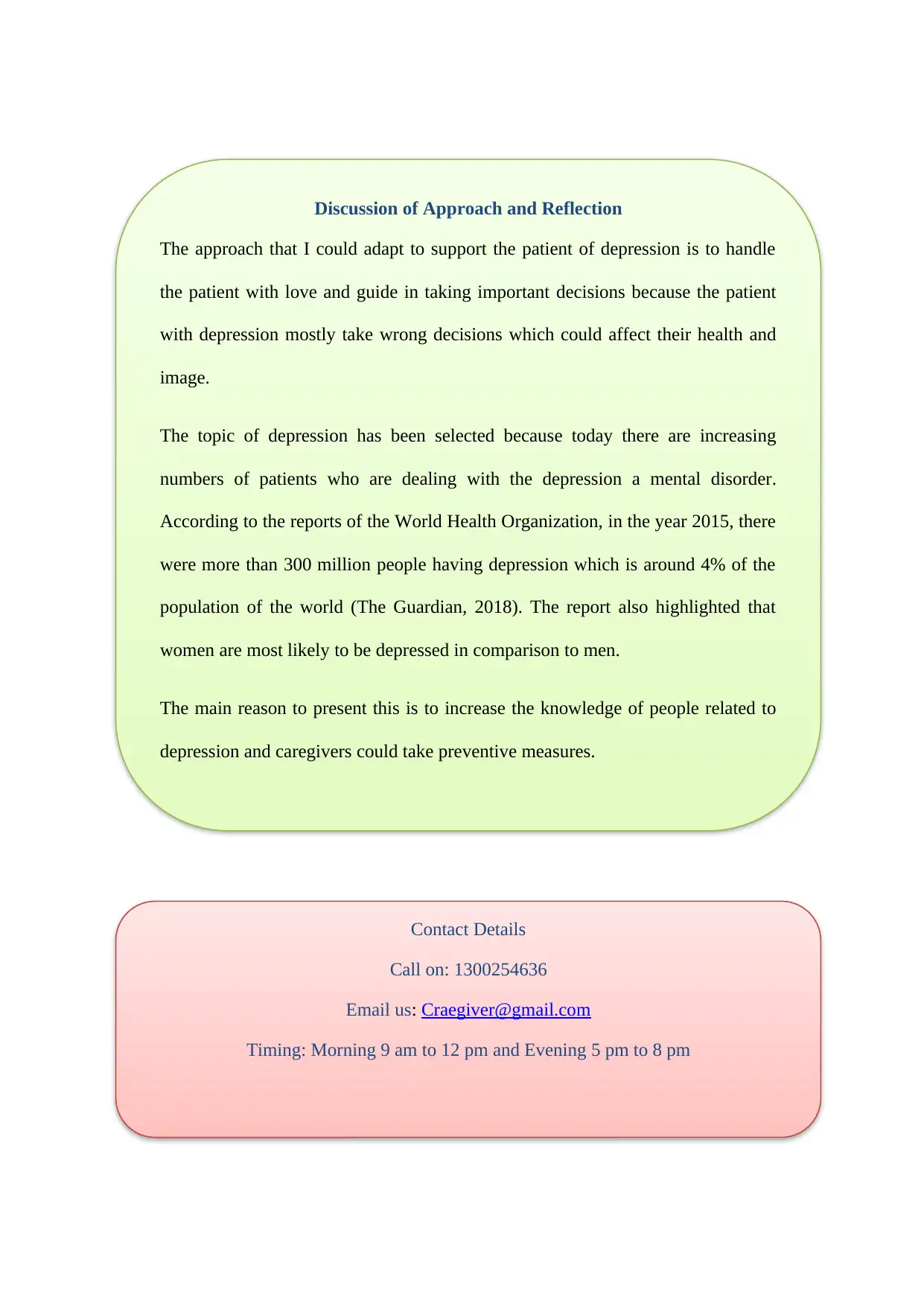
Discussion of Approach and Reflection
The approach that I could adapt to support the patient of depression is to handle
the patient with love and guide in taking important decisions because the patient
with depression mostly take wrong decisions which could affect their health and
image.
The topic of depression has been selected because today there are increasing
numbers of patients who are dealing with the depression a mental disorder.
According to the reports of the World Health Organization, in the year 2015, there
were more than 300 million people having depression which is around 4% of the
population of the world (The Guardian, 2018). The report also highlighted that
women are most likely to be depressed in comparison to men.
The main reason to present this is to increase the knowledge of people related to
depression and caregivers could take preventive measures.
Contact Details
Call on: 1300254636
Email us: Craegiver@gmail.com
Timing: Morning 9 am to 12 pm and Evening 5 pm to 8 pm
The approach that I could adapt to support the patient of depression is to handle
the patient with love and guide in taking important decisions because the patient
with depression mostly take wrong decisions which could affect their health and
image.
The topic of depression has been selected because today there are increasing
numbers of patients who are dealing with the depression a mental disorder.
According to the reports of the World Health Organization, in the year 2015, there
were more than 300 million people having depression which is around 4% of the
population of the world (The Guardian, 2018). The report also highlighted that
women are most likely to be depressed in comparison to men.
The main reason to present this is to increase the knowledge of people related to
depression and caregivers could take preventive measures.
Contact Details
Call on: 1300254636
Email us: Craegiver@gmail.com
Timing: Morning 9 am to 12 pm and Evening 5 pm to 8 pm
Secure Best Marks with AI Grader
Need help grading? Try our AI Grader for instant feedback on your assignments.
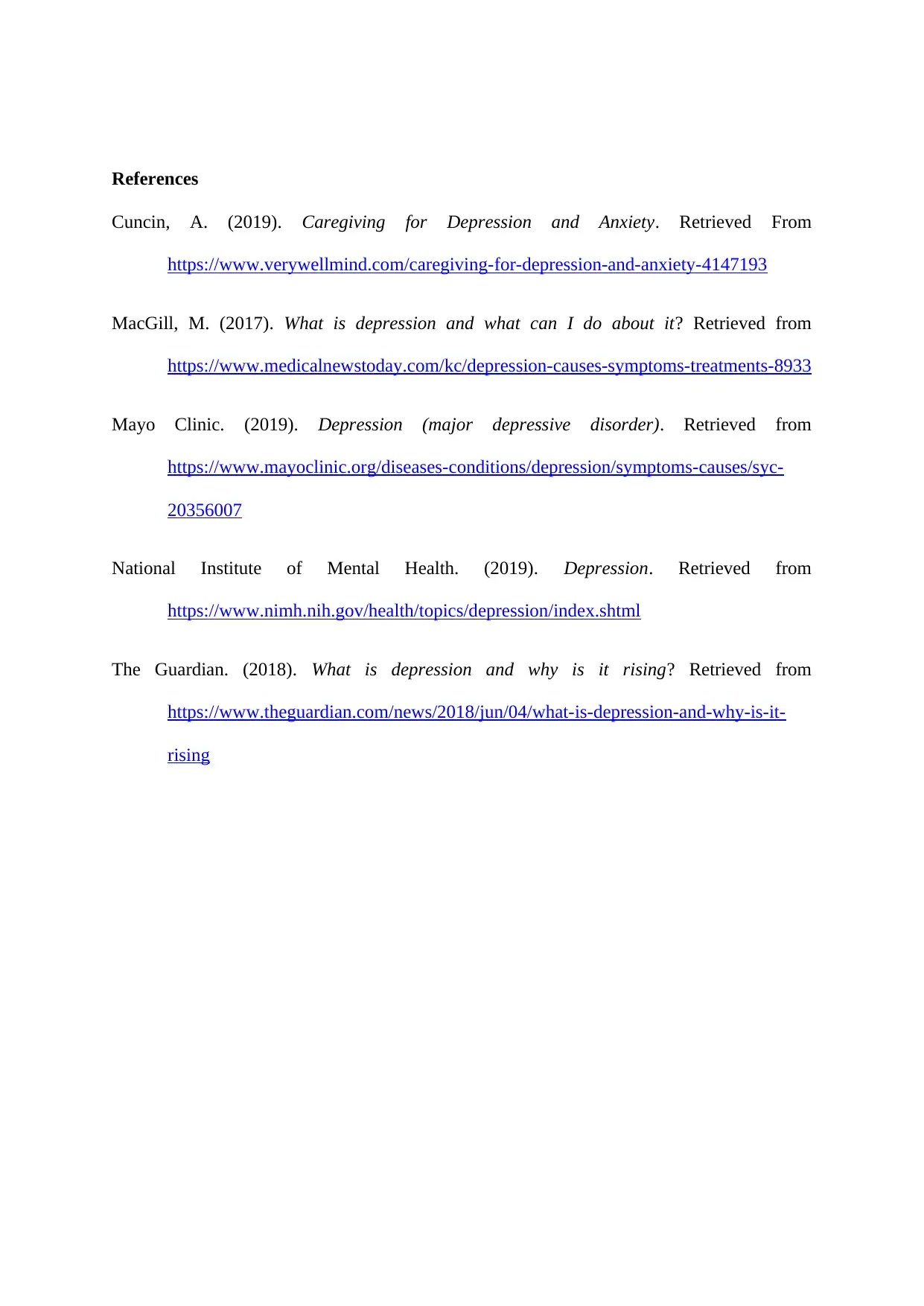
References
Cuncin, A. (2019). Caregiving for Depression and Anxiety. Retrieved From
https://www.verywellmind.com/caregiving-for-depression-and-anxiety-4147193
MacGill, M. (2017). What is depression and what can I do about it? Retrieved from
https://www.medicalnewstoday.com/kc/depression-causes-symptoms-treatments-8933
Mayo Clinic. (2019). Depression (major depressive disorder). Retrieved from
https://www.mayoclinic.org/diseases-conditions/depression/symptoms-causes/syc-
20356007
National Institute of Mental Health. (2019). Depression. Retrieved from
https://www.nimh.nih.gov/health/topics/depression/index.shtml
The Guardian. (2018). What is depression and why is it rising? Retrieved from
https://www.theguardian.com/news/2018/jun/04/what-is-depression-and-why-is-it-
rising
Cuncin, A. (2019). Caregiving for Depression and Anxiety. Retrieved From
https://www.verywellmind.com/caregiving-for-depression-and-anxiety-4147193
MacGill, M. (2017). What is depression and what can I do about it? Retrieved from
https://www.medicalnewstoday.com/kc/depression-causes-symptoms-treatments-8933
Mayo Clinic. (2019). Depression (major depressive disorder). Retrieved from
https://www.mayoclinic.org/diseases-conditions/depression/symptoms-causes/syc-
20356007
National Institute of Mental Health. (2019). Depression. Retrieved from
https://www.nimh.nih.gov/health/topics/depression/index.shtml
The Guardian. (2018). What is depression and why is it rising? Retrieved from
https://www.theguardian.com/news/2018/jun/04/what-is-depression-and-why-is-it-
rising
1 out of 5
Your All-in-One AI-Powered Toolkit for Academic Success.
+13062052269
info@desklib.com
Available 24*7 on WhatsApp / Email
![[object Object]](/_next/static/media/star-bottom.7253800d.svg)
Unlock your academic potential
© 2024 | Zucol Services PVT LTD | All rights reserved.
